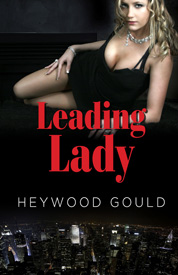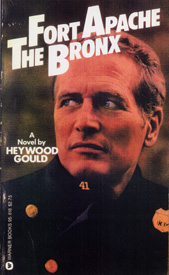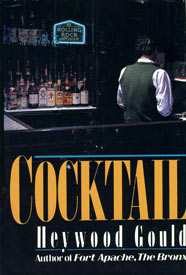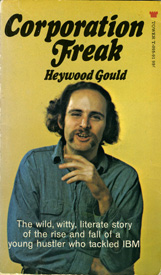*For Introduction with submission guidelines go to Oct 13. Use Contact Us, above, for submissions.
Heywood Gould is the author of 9 screenplays including “Rolling Thunder,” Fort Apache, The Bronx,” Boys From Brazil,” and “Cocktail.”
EMPIRES OF CRIME/Part 5
By
Heywood Gould
ACT TWO
EXT. BOWERY. NIGHT.
A few weeks later. The Bowery is the Broadway of downtown New York, featuring VAUDEVILLE THEATERS, SALOONS, crowds of ROWDIES out for a night on the town. Maier and Benny stand outside a saloon gaping at the painted WHORES and their flashy PIMPS. Maier has a cigarette dangling out of the corner of his mouth. Benny ogles the women.
BENNY
Salvatore gettin’ us
broads?
MAIER
Nah. Business before
pleasure.
They peek into saloon thick with smoke and honky tonk music
SALVATORE
is talking to a FIDGETY MAN at the bar. A YOUNG WHORE pushes through the swinging doors, dragging a giggly, staggering DRUNK.
YOUNG WHORE
C’mon honey, let’s get some
air.
TWO YOUNG MEN jump out and drag the drunk into an alley. They blackjack him to the ground, then “roll” him, taking his pocket watch and billfold. IN THE BAR a buxom singer is drawing cheers with her song.
BUXOM SINGER
The wealthy Four Hundred in
mansions reside/ With fronts
of brown stone and stoops high
and wide/While the poor working
people in poverty deep/ In
cellars and shanties are huddled
like sheep
INT. OSWOSSO LUTHERAN. NIGHT
A church social. YOUNG TOM DEWEY is singing as MARY SIMMONS, a young girl accompanies him on the piano. COUPLES take their last dance and wander out hand in hand as the song ends.
YOUNG TOM
Good night Irene, Irene/
Good night Irene/ Good
night Irene, Good night
Irene/ I’ll see you in
my dreams.
EXT.SALOON. NIGHT.
Salvatore returns with a bottle of gin and a small package.
SALVATORE
Keep chickie for the cops…
He draws a VIAL OF COLORLESS LIQUID out of his pocket. Reaches into his pants pocket for several small GLASS JARS.
SALVATORE
Used to buy opium in a drug
store like cough syrup. Then
the law said it wasn’t legal
no more. But people still
want it so I give it to ‘em.
MAIER
How you make money?
Salvatore pours a small amount of opium into the jars, then fills them up with gin.
SALVATORE
I buy the dope off that
junkie in the saloon. Five
bucks a bottle. Cut it with
gin and sell it for three
bucks a jar to the girls on
Essex Street.
MAIER
You could get guys on the
street to sell it for you
so you don’t gotta worry
about cops.
BENNY
The broads like this stuff?
SALVATORE
They love it. You should
see ‘em jump when I come
around.
INT. ROSIE SOLOMON’S. DAY
A brothel in the back room of a saloon. Through a beaded curtain, we can see MEN drinking and hear a PIANO playing. Under red lights, YOUNG GIRLS in camisoles, giggle and gossip with CLIENTS, WORKING MEN of all ages. Salvatore, Maier and Benny enter and are immediately surrounded by GIRLS flirting, entreating “Sal, you bring me a present?”..”Got any of that nose candy, Sal..?” Salvatore brushes them off with a laugh “I don’t see you givin’ nothin’ away.” MOTCHIE, the pimp steps out with a desperate grin. He is young and full of bluster, but wary of Salvatore.
MOTCHIE
I supply the girls around
here.
SALVATORE
They like my product better.
(menacing)
That okay with you, Motchie?
Motchie is about to defy him, but Benny moves in with a crazy look and he backs off with an ingratiating smile.
MOTCHIE
Sure as long as they’re
happy.
SALVATORE
These are my friends, Benny
and Maier. Take good care of
‘em.
Benny goes for a CURVY BRUNETTE.
BENNY
I’ll take that zaftig one…
He thrusts a few crumpled bills at Motchie, but Salvatore slaps his hand away.
SALVATORE
Put your money away. Only
crums pay for it, right
Motchie? It’s my friend
Maier’s birthday. Get
somethin’ nice for him.
MOTCHIE
Sure Sal…Hey Pearl, where
ya hidin’?
PEARL
a consumptive redhead in a black shift steps out of a room.
PEARL
Where ya think?
SALVATORE
(gives Maier a shove)
What are you waitin’ for?
Go, have a good time…
Maier walks timidly down the hall, turning to protest:
MAIER
But it ain’t my birthday.
INT. PEARL’S ROOM. DAY.
An old iron bedstead, rumpled sheets. Maier watches shyly as Pearl lights an oil lamp. A reddish glow spreads through the room.
PEARL
So how old are you?
MEYER
I told ya. It ain’t my
birthday.
All business, Pearl pulls her shift over her head.
PEARL
You gotta get a little
closer, or it don’t work
so good…
Meyer sits next to her. She tousles his hair.
PEARL (CONT’D)
This your first time?
MEYER
Yeah…
PEARL
Don’t be scared honey,
it’s easy…
(pushes him down onto the bed)
Mama’ll do all the work…
INT. SALVATORE’S ROOM.NIGHT.
A basement room. A bed and a rickety table. JARS and BOTTLES. Salvatore and the boys enter in the darkness.
SALVATORE
This here’s my office.
BENNY
You live here too?
SALVATORE
(lights a candle)
Yeah. My old man threw me
out. I slip money to my
brother to give to my mother…
BENNY
I had to leave Brooklyn.
Toomany guys lookin’ for
me. But I’ll go back there
one dayflippin’ gold pieces,
broads hangin’ offa me…
SALVATORE
You still livin’ at home,
Maier?
MAIER
Yeah.
SALVATORE
Your mother know what
you’re doin’?
MAIER
She gets mad. But I’m
goin’ to school for
mechanic work.
BENNY
You ain’t gonna get a
job are you?
MAIER
Why not? A lotta guys do
it.
SALVATORE
That’s ‘cause they can’t
scheme like you. You think
those crums would work for
a dollar a day if they could
make thirty bucks hustlin’
crap games?
BENNY
Everybody wants to be like
us…
MAIER
Like us, huh. Freezin’ in
a basement with rats runnin’
around…
SALVATORE
At least we’re on our own
and no crum is makin’ money
off our backs…My old man’s
gonna die poor.
MAIER
Mine, too.
SALVATORE
See what I mean? At least
we got a chance to get rich.
EXT. COUNTRY ROAD. NIGHT.
A peaceful world. Quiet, starry, leaves rustling, crickets chirping. Tom and Mary walk up to a farmhouse..
YOUNG TOM
I’m goin’ out for football.
(makes a muscle)
That farm work’s makin’ me
real strong for the tryout
MARY
(feels his bicep)
You’ll make the team for
sure.
YOUNG TOM
I’m joinin’ Debating Club.
I’m gonna need public speaking
when I go into politics…
MARY
You gonna make those long
boring speeches at the
July Fourth picnic?
YOUNG TOM
Maybe I’ll just sing a
song…
MARY
(laughs)
Tom Dewey, the singing
Senator.
YOUNG TOM
(a mock song)
And if elected I will
uphold our cherished
Republican values.
MARY
You’re a sketch, Tom. I
almost think you could
do it.
(offers her hand )
Well, thanks for walkin’
me home.
Tom moves in and “steals” a kiss. Mary laughs and pushes him away.
MARY
Why Tom Dewey. I thought
you were such a good boy…
YOUNG TOM
(puts his arms around her)
Only when I have to be.
This time the kiss is mutual
EXT. LOWER EAST SIDE STREET. NIGHT.
Only a year has passed. The boys are seventeen, but look older, more sure of themselves. Salvatore and Benny and are keeping“lookout” as Meyer jumps in the front seat of a Model T.
SALVATORE
How you gonna start it, you
don’t got the key?
MAIER
(fiddling with the wires)
Just watch the guy don’t
come out.
Sparks fly under the wheel as he makes a connection. He jumps out and turns the crank. The Model T sputters into action.
BENNY
How’d you do that?
MAIER
Get in.
But as they move away, the OWNER runs out, followed by THREE MEN. “Hey, where ya goin’” Maier tries to speed away, but the car bucks and stalls. Benny jumps out wielding a wrench and rushes them, swinging wildly knocking three men down. Salvatore pulls a knife and holds the other man at bay. Maier runs around and cranks the car until it starts again. Salvatore jumps in.
MAIER
Benny!
Benny runs back and jumps into the car and it clatters away, leaving the three men lying in the street.
EXT. LIVERY STABLE. DAY’
Early morning. The place is half stable, half garage, horses on one side, MODEL T’s and STUTZ BEARCATS on the other. Benny, clothing torn, nose bloody, watches as Maier and Salvatore negotiate with a BURLY BLACKSMITH.
BLACKSMITH
Where’d you get the car?
MAIER
My father gave it to me
for my Bar Mitzvah, what
do you care? Fifty bucks
is a fair price.
BLACKSMITH
I’ll give you twenty.
SALVATORE
C’mon you’ll get two
hundred…
BLACKSMITH
You stole this heap. I
could call a cop friend
and get it for nothin’.
Benny looks around with a casual smile; he has developed a new technique for intimidating people.
BENNY
Better call a fireman friend,
too.
BLACKSMITH
What for?
BENNY
To put out the fire when
I burn this joint down
with you in it.
The Blacksmith is about to answer. Benny just shrugs.
BENNY
Nice place you got here.
BLACKSMITH
Okay. Fifty bucks.
MAIER
(smells his fear)
Make it a hundred for
hollerin’ copper.
Salvatore laughs and puts his arm around the Blacksmith’s shoulders.
SALVATORE
Make it a hundred fifty
and throw in your horse…
Partner.
EAST SIDE 1917
EXT. RAPPAPORT’S RESTAURANT.DAY
A few years later. Meyer and Benny have grown up and found their personal styles. Meyer is understated in a gray topcoat, hat pulled low. Benny is brash in a cashmere coat with a fur collar. He stops to tilt it at a rakish angle.
MEYER
C’mon, I’m hungry…
INT. DAIRY RESTAURANT. DAY.
Noisy, crowded with ORTHODOX JEWS,GARMENT WORKERS,etc. MOTCHIE the pimp is at a table with his GIRLS. The girls wave and call “Hiya Benny…” At a round table in the back, gorging themselves on bagels and lox, are LEPKE BUCHALTER, squat and fierce and his partner GURRAH SHAPIRO, gross, thick lipped, with an uncaring stare.
SHAPIRO
The toughest boys on the
East Side.
BENNY
Toughest boys in the world.
LEPKE
Wanna make some easy
money?
MEYER
Nah, I wanna sew buttons
twelve hours a day.
LEPKE
There’s a strike at the
Weinberg Bakery. Mr.
Weinberg is a good friend…
MEYER
Yeah and you’re a silent
partner.
SHAPIRO
We want you to break up
the strike, send the boys
back to work…Fifty bucks.
MEYER
Hundred’s the goin’ rate,
Lepke.
LEPKE
A hundred? It’s ten minutes
work.
Benny takes a bite out of Lepke’s bagel.
MEYER
For us. Anybody else you’ll
need a mob and it’ll cost a
G note.
BENNY
We’re savin’ you money,
Lepke.
A blustery winter day. STRIKERS shiver on a picket line, Exhorting PASSERSBY to “Pass’em by…”
A TAXI
pulls up. Meyer and Benny get out..
BENNY
Keep the meter runnin’, we’ll
be back…
RABINOWITZ
Meyer’s childhood friend, is
shouting instructions.
MEYER
Rabinowitz. You the boss
here?
RABINOWITZ
You one of Lepke’s shlammers,
Maier?
MEYER
If I have to be. You gotta
go back to work, kid.
RABINOWITZ
Weinberg’s profit has doubled,
but he won’t pay us a living
wage, Maier. Whaddya think of
that?
LANSKY
I think it’s smart business
if he can get away with it
and we’re here to see that
he does…
BENNY
Back to work baker, your
bagels are gettin’ cold…
RABINOWITZ
You guys don’t scare me…
Benny punches the Rabinowitz flush in the face. Grabs him as he falls forward and gut punches him. The other STRIKERS run to their leader’s defense. A TOUGH STRIKER advances on Maier.
TOUGH STRIKER
Think you can fight
thirty-five guys?
Benny leaps at the Tough Striker, knocking him to the ground, beating him with the wooden handle of his placard.
BENNY
Now it’s thirty-four…
Who wants to try for
thirty-three?
MEYER
Hold it Benny…
(and faces the Strikers)
You know the Golden Rule?
The guy with the gold rules.
Weinberg’s gonna win in the
end so go back to work, you
got mouths to feed.
BENNY
leans over the bleeding semi-conscious Rabinowitz and shoves a few bills in his pocket.
BENNY
Here, take your girlfriend
out dancin’ on Ben Siegel…
INT. HAT STORE. DAY
Salvatore is loading JARS OF MORPHINE and “raviolis” of COCAINE in a hat box, then concealing them under DERBY HATS.
OWNER
(o.s.)
Ready for the deliveries,
Salvatore?
SALVATORE
Ready, Mr. Gordon.
EXT. ESSEX STREET. DAY
Salvatore struts happily, three hatboxes in each hand.
MOTCHIE
is standing on the corner with two cops. He steps into the shadows as the cops block Charley’s way.
RED FACED COP
What’s in the boxes,
Tony?
SALVATORE
Hats from the Gordon Hat
Company.
The red faced cop opens a box and comes up with a “ravioli.”
RED FACED COP
Hats, huh?
Salvatore tries to run, but the red faced cop flicks his nightstick between his feet and he goes down. The fat cop kneels on his back, pushing his face into the ground.
FAT COP
Who told you could sell hop
around here?
SALVATORE
Who I gotta ask?
FAT COP
Who you think, you dumb
wop?
SALVATORE
That pimp Motchie’s sellin’
it,too.
RED FACED COP
(snapping on the cuffs)
Motchie’s with us. You’re
not.
SALVATORE
Take my load. I got eight
bucks in my sock. Take it
for lettin’ me go.
FAT COP
We’ll takin’ it for not
bustin’ your head. You’re
gonna go cool off up the
river. When you come back
maybe you’ll know how
things work.
They jerk Salvatore to his feet and start to march him away. He turns with a cold, vengeful look toward Motchie.
SALVATORE
Yeah. I’ll know how things
work.
END ACT TWO
Next: Part 6/Act Three: Getting Some Class (Monday, 11/07/11)
In a new department the Daily Event will reoffer some of these scripts. Read them and decide: would you like to have seen this movie?
Our first script is EMPIRES OF CRIME. Seven years in development it is a six part mini-series commissioned by a broadcast network and later reacquired by a cable station.
The story is about the founders of Organized Crime, Meyer Lansky, and “Lucky” Luciano, their fifty year partnership and the empire they created. Their friendships and families, lives and loves. It is also about their implacable enemy Thomas Dewey, a young Republican attorney who built a political career prosecuting the Mob that propelled him to the NY Governor’s Mansion and almost to the White House.
*For Introduction with submission guidelines go to Oct 13. Use Contact Us, above, for submissions.



